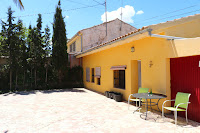Big Brother has a file on me

I got a message from SUMA, a local government tax collection agency, telling me that I could check what they were going to take out of my bank account in April. In their email there was a link that took me to something called Carpeta Ciudadana - the Citizen File. The Carpeta Ciudadana is basically a site that collects together lots of the information held on me by various Government agencies. There was a list of all the ministries - from defence and education to work and immigration - and any procedures that I had open with them. There was another section for notifications, another for information held on me and so on. I was a bit worried that the page showed that Hacienda, the tax people, had two processes open on me but then I realised that it was to do with the time I sorted out some unpaid tax on a small UK pension during a tax amnesty. It's not as though I have anything to hide but the fewer dealings I have with authority the better I like it. It was amazing checking t...




